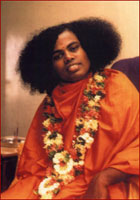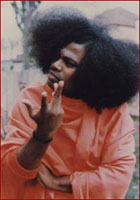At the beginning of the 20th century, a great saint, Swami Paramaguru of Sri Lanka, foretold Swami Premananda’s birth and spiritual power to Swamiji’s grandmother. He was born on 17th November 1951 in Matale, Sri Lanka and the elderly saint’s predictions steadily came true.
Swami Premananda was born with extraordinary powers such as the ability to materialize objects, to heal people and to know the past, present and future. This seemed very natural to him and, during his childhood, he thought that everybody could do the same. Slowly he discovered that this was not so. At the age of 14, through deep meditative states, he discovered that he could help humanity on the spiritual path by using these special gifts. He then decided to dedicate his life entirely to God and to help aspirants know the Truth and purpose of their existence. He also dedicated himself to uplift people spiritually. At the age of 17, during a public Hindu festival, his white clothes miraculously changed to orange, the colour worn by Hindu monks.
His compassion and unconditional love are expressed through his care for others, especially for the poor. Swami Premananda founded various Ashrams[1] and orphanages in Sri Lanka. In 1983 the main Ashram burned down during ethnic riots and Swami Premananda came to South India. He founded an Ashram there near Trichy for aspirants who are sincerely interested in spirituality whatever their experience or background. The Ashram is also a place where spirituality is reflected through various social projects, including a home for destitute children and a free school.
People feel attracted by Swamiji’s humble and simple way of conveying deep spiritual wisdom. Some appreciate his very practical approach and sense of humour whilst others feel it worthwhile to participate in the service ativities. At another level, many experience his supportive presence in their day-to-day lives and that he solves their physical, mental and spiritual problems as well as guiding them on their spiritual paths. Swami Premananda accepts everyone with loving care.
Swami Premananda’s life work and teachings:
People from many nationalities and belief systems and from all social
levels seek Swami Premananda’s help and advice on their individual
spiritual journeys. Swami Premananda sees the main part of his life
work to support sincere seekers, help them and lead them towards the
experience of infinite peace and permanent happiness. He encourages
them to gradually realize their own divine nature. He encourages
all to become strong and self-confident, to think for themselves and to
experience the fundamental unity of all life. He advises us to
adapt our lives according to spiritual principles leading to
self-knowledge and divine experience.Swamiji says that his teaching is nothing new. However, it is spontaneous and natural and he is a living example of what he teaches. He says that his teaching is traditionally known as Sanatana Dharma, the Eternal Truth.
There are Sri Premananda Centres and groups around the world. For any further information about Swami Premananda’s life, his teachings or the Ashram, please contact the Coordinator PR Department Swami Premananda Nederland:
Mw. J.L.W.M. Kemble - van der Plas
Plevierstraat 771742 AL Schagen
Tel / fax: 0224 - 29 50 44
Email:akasha@quicknet.nl
or
Mw. Jacintha Kemble
Email:akasha@quicknet.nl
Web:www.sripremananda.org
[1]
Traditionally, an Ashram is a community living according to Sanatana Dharma or the ageless teachings of wisdom.
Often a spiritual master, who has practical spiritual experience and points the correct way to aspirants, guides the Ashram.
Historically, many sages went through years of spiritual practice before being accepted as spiritual teachers.
The Hindu religion accepts a wide variety of paths and, accordingly, there are many different kinds of Ashrams. Each one emphasizes a specific aspect of the same spirituality and thus attracts aspirants who feel in harmony with that particular aspect.
Traditionally, an Ashram is a community living according to Sanatana Dharma or the ageless teachings of wisdom.
Often a spiritual master, who has practical spiritual experience and points the correct way to aspirants, guides the Ashram.
Historically, many sages went through years of spiritual practice before being accepted as spiritual teachers.
The Hindu religion accepts a wide variety of paths and, accordingly, there are many different kinds of Ashrams. Each one emphasizes a specific aspect of the same spirituality and thus attracts aspirants who feel in harmony with that particular aspect.





